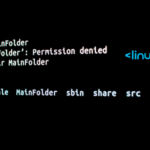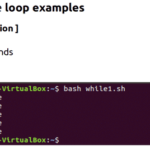What is read?
Read is a bash builtin command that reads the contents of a line into a variable. It allows for word splitting that is tied to the special shell variable IFS. It is primarily used for catching user input but can be used to implement functions taking input from standard input.
Bash read builtin command help
Before we dive into how to use the read command in bash scripts, here is how we get help. There you should see all the options available for the read command along with descriptions that we will try to cover in the examples.
Command line
Output
[-p prompt] [-t timeout] [-u fd] [name …]
Read a line from the standard input and split it into fields.
Reads a single line from the standard input, or from file descriptor FD
if the -u option is supplied. The line is split into fields as with word
splitting, and the first word is assigned to the first NAME, the second
word to the second NAME, and so on, with any leftover words assigned to
the last NAME. Only the characters found in $IFS are recognized as word
delimiters.
If no NAMEs are supplied, the line read is stored in the REPLY variable.
Options:
-a array assign the words read to sequential indices of the array
variable ARRAY, starting at zero
-d delim continue until the first character of DELIM is read, rather
than newline
-e use Readline to obtain the line in an interactive shell
-i text use TEXT as the initial text for Readline
-n nchars return after reading NCHARS characters rather than waiting
for a newline, but honor a delimiter if fewer than
NCHARS characters are read before the delimiter
-N nchars return only after reading exactly NCHARS characters, unless
EOF is encountered or read times out, ignoring any
delimiter
-p prompt output the string PROMPT without a trailing newline before
attempting to read
-r do not allow backslashes to escape any characters
-s do not echo input coming from a terminal
-t timeout time out and return failure if a complete line of
input is not read within TIMEOUT seconds. The value of the
TMOUT variable is the default timeout. TIMEOUT may be a
fractional number. If TIMEOUT is 0, read returns
immediately, without trying to read any data, returning
success only if input is available on the specified
file descriptor. The exit status is greater than 128
if the timeout is exceeded
-u fd read from file descriptor FD instead of the standard input
Exit Status:
The return code is zero, unless end-of-file is encountered, read times out
(in which case it‘s greater than 128), a variable assignment err
Catching user input
Interactive bash scripts are nothing without catching user input. The read builtin provides methods that user input may be caught within a bash script.
Catching a line of input
To catch a line of input NAMEs and options are not required by read. When NAME is not specified, a variable named REPLY is used to store user input.
Commands
echo -n "Type something and press enter: ";
read;
echo You typed ${REPLY}
}
Output
You typed something
Catching a word of input
To catch a word of input, the -d option is required. In the case of a word we would set -d to a space, read ‘-d ‘. That is when the user presses the space bar read will load REPLY with the word.
Note that when the -d option is set, the backspace does not work as expected. To backspace, while trying to catch a word of input, the -e option may be used, read -e ‘-d ‘.
Commands
echo -n "Type something and hit space: ";
read ‘-d ‘;
echo "";
echo "You typed ${REPLY}"
}
Output
You typed something
Prompt user
In interactive bash scripts prompting a user may require a message to tell the user what input is expected. We can always accomplish this using the echo builtin. However, it turns out there is an option using read.
Prompt user for a word
In catching a word of input, we used echo to write Type something and hit space: to standard output before read ‘-d ‘. The -p option allows a message to be displayed before reading from standard input.
Commands
read -p ‘Type something and hit space: ‘ ‘-d ‘;
echo "";
echo "You typed ${REPLY}"
}
Output
You typed something
Prompt user for a secret
When catching user input without it showing up int the terminal, the -s option comes in handy. read -s -p allows you to catch and hide user input as follows.
Commands
read -s -p ‘Type something I promise to keep it a secret: ‘
echo "";
echo "Your secret is safe with me" ; unset REPLY ;
echo "${REPLY}"
}
Output
Your secret is safe with me
Functions using read
Here are examples of functions in bash that use read and standard input
Core concept
Functions using read make use of piped standard input and parameters. Main input to be process such as lines in a file are passed in through standard input via a pipe. Other input if-any and option are passed in as parameters.
read is a builtin command
-t 1 prevent the bash script from waiting indefinitely for a line to be returned through standard input. If standard input is initially empty, the function returns with an exit code of 142 signifying that no date was read within the set timeout period
… many variable names may be listed
Now that the groundworks are set, let’s see what familiar functions look like implemented using read.
Join function using read
Suppose we want a join function that takes a list of words and returns another list of words joined by a delimiter. Here is how we may implement a join function using read.
#!/bin/bash
## join
## version 0.0.2 – fix recursion parameters
##################################################
join() { { local indelimiter; indelimiter="${1- }" ; local outdelimiter;
outdelimiter="${2-.}" ; }
local car
local cdr
local IFS
IFS="${indelimiter}"
read -t 1 car cdr || return
test "${cdr}" || { echo "${car}" ; return ; }
echo "${car}${outdelimiter}${cdr}" | ${FUNCNAME} "${indelimiter}"
"${outdelimiter}"
}
##################################################
## generated by create-stub2.sh v0.1.2
## on Mon, 17 Jun 2019 12:24:59 +0900
## see <https://github.com/temptemp3/sh2>
##################################################
Source: join.sh
Command line
Output
Command line
Output
Map functions using read
Suppose we want a map function that takes a list and returns another list containing the same number of elements that are modified by another function. Here is how we may implement a map function using read.
#!/bin/bash
## map
## version 0.0.1 – initial
##################################################
map() { { local function_name ; function_name="${1}" ; }
local car
local cdr
local IFS
IFS="${indelimiter- }"
read -t 1 car cdr || return
test "$( declare -f ${function_name} )" || return
test "${car}" || { true ; return ; }
${function_name} ${car}
echo "${cdr}" | ${FUNCNAME} "${function_name}"
}
##################################################
## generated by create-stub2.sh v0.1.2
## on Tue, 18 Jun 2019 08:33:49 +0900
## see <https://github.com/temptemp3/sh2>
##################################################
Source: map.sh
Commands
echo {1..10} | map pow
Output
4
9
16
25
36
49
64
81
100
Filter function using read
Suppose we want a filter function that takes a list and returns a sublist of elements satifying conditions set by another function. Here is how we may implement a filter function using read.
#!/bin/bash
## filter
## version 0.0.1 – initial
##################################################
filter() { { local function_name ; function_name="${1}" ; }
local car
local cdr
local IFS
IFS="${indelimiter- }"
read -t 1 car cdr || return
test "$( declare -f ${function_name} )" || return
test "${car}" || { true ; return ; }
${function_name} "${car}" || echo -n "${car} "
echo "${cdr}" | ${FUNCNAME} "${function_name}"
}
##################################################
## generated by create-stub2.sh v0.1.2
## on Tue, 18 Jun 2019 13:19:54 +0900
## see <https://github.com/temptemp3/sh2>
##################################################
Source: filter.sh
Commands
echo {1..10} | filter odd
Output
Loops using read
Loops using read allow you to iterate through lines of a file that is to be generated or already exists.
Basic while read loop for the lefthand side (lhs)
We have a command or function (lhs) that can generate lines in a file that can be looped through using read and a while loop.
lhs | while read
do
true
done
lhs is a command that returns a list of lines
Commands
do
echo ${i}
done
Output
2
3
4
5
Basic while read loop for the righthand side (rhs)
We have a file (rhs) with lines that can be looped through using read and a while loop.
while read
do
true
done < rhs
rhs is a file containing lines
Commands
while read i
do
echo ${i}
done < rhs
Output
1
2
3
4
5
Custom lhs while loop using read
We have a stream of words that we would like to loop through using read.
(
IFS=" "
lhs | while read
do
true
done
)
lhs is a list of words
Commands
IFS=" "
echo {1..5} | while read i
do
echo "${i}
done
)
Output
Reading from any fd instead of standard input
The read builtin option often left untouched is the one that allows you to specific what file descriptor to read from, read -u FD. By default FD is taken to be standard input.
Core concept
When a file opened file descriptors are assigned. IO redirection in bash allow a file to be left open with a specific file descriptor. We are allowed to write to the file, read from it, and close it when we are done.
{
cat /dev/null > myfifo; # empty myfifo
exec 3< myfifo; # open file myfifo as fd 3
echo "Hello, World! – from fd 3" > myfifo; # write to myfifo
read -u 3; # read line from fd 3
exec 3>&-; # close fd 3
echo ${REPLY} # output line read from fd 3 before closing
}
_ # Hello, World! from fd 3
Building a train with file descriptors and read -u FD
Just for fun I decided to build a train with file descriptors and read -u FD. To each file descriptor a number is written. Each file descriptor reads from the file descriptor 1 below and appends to itself.
Command line
Output
initializing fd 3 …
fd 3 intialized
initializing fd 4 …
fd 4 intialized
fds intialized
reading from fd 3 and 4 …
4 3
fds before cleaning up
0 1 2 3 4 5
cleaning up …
cleaning up fds …
done cleaning up fds
fds after cleaning up
0 1 2 3
Skip function using read -u FD
If you are running
MINGW64_NT-10.0 DESKTOP-XVVVVVV 2.7.0(0.307/5/3)
2017-02-17 14:20 x86_64 Msys
bash –version
GNU bash, version 4.4.12(1)-release (x86_64-pc-msys)
it may be possible due to a bug to implement a skip function that skips the following line in a bash script outside of functions before the script source is read. Note that it does not work on most systems. For example,
Linux 4.9.0-8-amd64 #1 SMP Debian 4.9.144-3.1 (2019-02-19) x86_64 GNU/Linux
bash –version
GNU bash, version 4.4.12(1)-release (x86_64-pc-linux-gnu)
skip does not fly.
Function
skip () { read -u 31 ; }
Commands
echo line skipped
true
Output
Bottom line
The read builtin in bash does more than catch user input. It can be used in functions, loops and exchanges between file descriptors used in bash scripts. On occasion exploration using read and file descriptors may yield Easter eggs.







